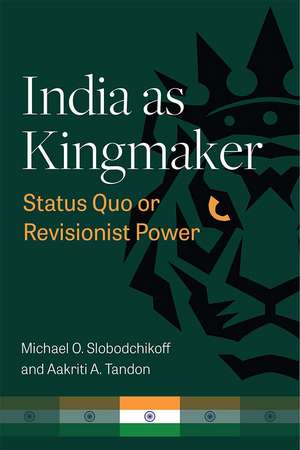India as Kingmaker: Status Quo or Revisionist Power
Autor Michael Slobodchikoff, Aakriti A Tandonen Limba Engleză Paperback – 30 dec 2022
As India finds itself in the envious position of kingmaker, both the status quo and revisionist major powers are jockeying for India’s support for either upholding or revising the current world order. Using India’s bilateral treaties as a proxy measure of the strength of its relationship with other major powers, Slobodchikoff and Tandon determine whether India will remain neutral in its foreign policy approach or adopt a more assertive role in shaping the future global order. This book provides an in-depth analysis of India’s bilateral ties with major powers that include the United States, Russia, China, Japan, as well as the European Union (including the United Kingdom, France, and Germany) and uses network analysis to study India’s foreign policy positions with other major powers.
Preț: 202.47 lei
Nou
Puncte Express: 304
Preț estimativ în valută:
38.75€ • 42.11$ • 32.58£
38.75€ • 42.11$ • 32.58£
Carte indisponibilă temporar
Doresc să fiu notificat când acest titlu va fi disponibil:
Se trimite...
Preluare comenzi: 021 569.72.76
Specificații
ISBN-13: 9780472055661
ISBN-10: 0472055666
Pagini: 178
Ilustrații: 15 figures, 24 tables
Dimensiuni: 152 x 229 x 15 mm
Greutate: 0.25 kg
Editura: UNIVERSITY OF MICHIGAN PRESS
Colecția University of Michigan Press
ISBN-10: 0472055666
Pagini: 178
Ilustrații: 15 figures, 24 tables
Dimensiuni: 152 x 229 x 15 mm
Greutate: 0.25 kg
Editura: UNIVERSITY OF MICHIGAN PRESS
Colecția University of Michigan Press
Notă biografică
Michael O. Slobodchikoff is Associate Professor and Chair of Political Science at Troy University.
Aakriti A. Tandon is Associate Professor of Political Science at Daemen College.
Aakriti A. Tandon is Associate Professor of Political Science at Daemen College.
Cuprins
List of Tables
List of Figures
Acknowledgments
Part 1 India's Place in the Global Order
Chapter 1 India as a Kingmaker
Chapter 2 The Challenge to the Global Order
Chapter 3 Treaty Networks and Determining State Preferences for the Global Order
Part 2 India’s Relationship with Status Quo Powers
Chapter 4 India-US Relations
Chapter 5 Indo-European Relations
Chapter 6 Indo-Japanese Relations
Part 3 India’s Relationship with Revisionist Powers
Chapter 7 Indo-Russian Relations
Chapter 8 Indo-Chinese Relations
Chapter 9 India’s Place in the World Order: Revisionist or Status Quo Power
Bibliography
List of Figures
Acknowledgments
Part 1 India's Place in the Global Order
Chapter 1 India as a Kingmaker
Chapter 2 The Challenge to the Global Order
Chapter 3 Treaty Networks and Determining State Preferences for the Global Order
Part 2 India’s Relationship with Status Quo Powers
Chapter 4 India-US Relations
Chapter 5 Indo-European Relations
Chapter 6 Indo-Japanese Relations
Part 3 India’s Relationship with Revisionist Powers
Chapter 7 Indo-Russian Relations
Chapter 8 Indo-Chinese Relations
Chapter 9 India’s Place in the World Order: Revisionist or Status Quo Power
Bibliography
Recenzii
“Slobodchikoff and Tandon have written a remarkably interesting and important contribution to research on status, major powers, and liberal order. An analysis of India’s role in the future liberal world order is long overdue.”
—J. Patrick Rhamey Jr., Virginia Military Institute
—J. Patrick Rhamey Jr., Virginia Military Institute
“India as Kingmaker is an important contribution to the field of International Relations, specifically the role of emerging or middle powers as linchpins in maintaining the global international order established by the hegemon.”
—Arijit Mazumdar, University of St. Thomas
—Arijit Mazumdar, University of St. Thomas
"This work contributes significantly to the field of international relations by elucidating the role of emerging powers in shaping the global order. It offers a nuanced understanding of India’s foreign policy choices and its preferred global structural alignment, enriching the discourse on international power dynamics."
Descriere
As India finds itself in the envious position of kingmaker, both the status quo and revisionist major powers are jockeying for India’s support for either upholding or revising the current world order. Using India’s bilateral treaties as a proxy measure of the strength of its relationship with other major powers, Slobodchikoff and Tandon determine whether India will remain neutral in its foreign policy approach or adopt a more assertive role in shaping the future global order. This book provides an in-depth analysis of India’s bilateral ties with major powers that include the United States, Russia, China, Japan, as well as the European Union (including the United Kingdom, France, and Germany) and uses network analysis to study India’s foreign policy positions with other major powers.
